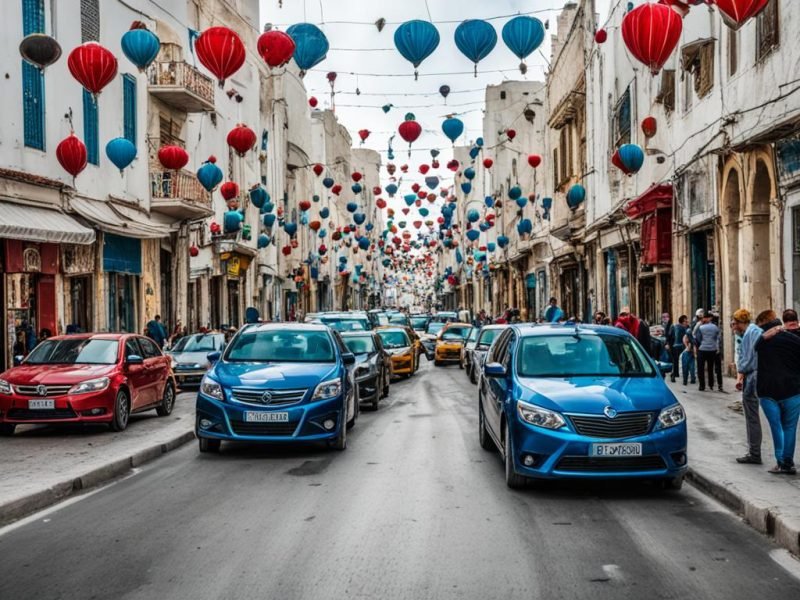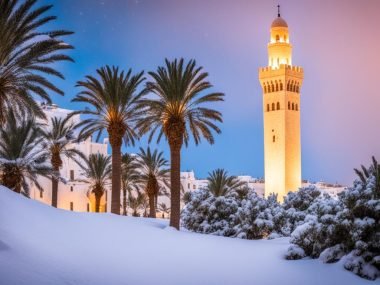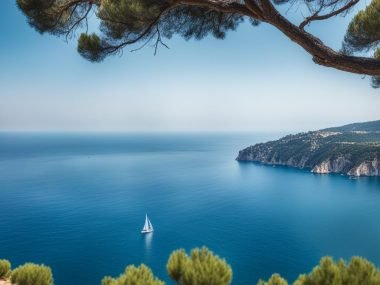Explore Tunisia’s large cities, shining as gems along the Mediterranean. In the heart of North Africa, Tunisia thrives with its urban landscapes. The List of major cities in Tunisia highlights Tunis as the top spot. This bustling capital houses 638,845 people. Following closely are Sfax and Sousse, boasting populations of 330,440 and 221,530.
Moving beyond these famous cities, you’ll discover Ettadhamen, Kairouan, and Gabès. Each city is filled with over 100,000 lively individuals. These cities stand out in the Tunisia big cities list. They are not just spots on a map. Each plays a key role in politics, economy, and culture.
Key Takeaways
- Tunis tops the list of major cities in Tunisia with its substantial population figure.
- Sfax and Sousse are vital players in the tapestry of Tunisia’s largest cities.
- Ettadhamen, Kairouan, and Gabès exemplify Tunisia’s extensive urban presence.
- Urban centers in Tunisia assume crucial roles in the dynamics of governance and economy.
- The demographic makeup of Tunisia reflects significant urban concentrations.
An Overview of Tunisia’s Urban Landscape
Exploring Tunisia reveals a vibrant urban mix of history and growth. This section covers the geography, history, and significance of Tunisia’s cities. It offers a full picture of its urban areas.
Geographical Spread of Tunisian Cities
Tunisia’s cities vary from lively coastal areas to historic inland towns. Tunis, the capital, is the core of urban life here, with a large population. The eastern coast has important ports like Sfax, showcasing Tunisia’s urban network.
Historical Development of Urban Centers in Tunisia
Tunis’s urban story goes back thousands of years, influenced by many empires. It’s now a key hub for politics and business. Cities like Sousse and Kairouan highlight Tunisia’s rich Islamic history, showing off its urban legacy.
Significance of Strategic Locations for Urban Growth
Tunis and Sfax’s strategic spots along trade routes have boosted their economy and culture. These cities are crucial in linking Tunisia with Mediterranean and African markets. They play a big part in its urban growth.
The data shared here shows how city size and strategic positions are key. They hugely influence Tunisia’s urban development and its place in global trends.
| City | Population | Key Features |
|---|---|---|
| Tunis | 3,980,500 | Capital, major economic hub, cultural diversity |
| Sfax | 955,421 | Major port, commercial center, maritime gateway |
| Sousse | 675,000 | Historical significance, tourist destination, trade hub |
| Kairouan | 186,653 | Cultural heritage, inland trade, historical sites |
This overview showcases the lively urban life in Tunisia. It emphasizes how crucial its cities are for the country’s future against global urban trends.
How Many Big City In Tunisia?
Tunisia’s big cities are more than just crowded places. They play key roles in the country’s leadership, economy, and culture. Each city is vital to Tunisian life. This part will give you a closer look at these important urban areas.
Understanding the Criteria for a ‘Big City’
In Tunisia, a ‘big city’ means more than lots of people living there. These cities are central to the country’s government and its economy. The capital, Tunis, is a perfect example. It’s not just crowded. It’s where important financial, political, and cultural actions happen. These activities shape Tunisia’s policies and its economy.
Tunisia’s Major Urban Hubs
When we look at Tunisia’s major cities, we see they do more than fill a space on a map. The capital, Tunis, is at the forefront because of its people and diverse economy. Sfax and Sousse are not far behind. They boost Tunisia’s economy with their trade and tourism. Other cities with over 100,000 people like Bizerte and Ariana, add to Tunisia’s varied urban scene.
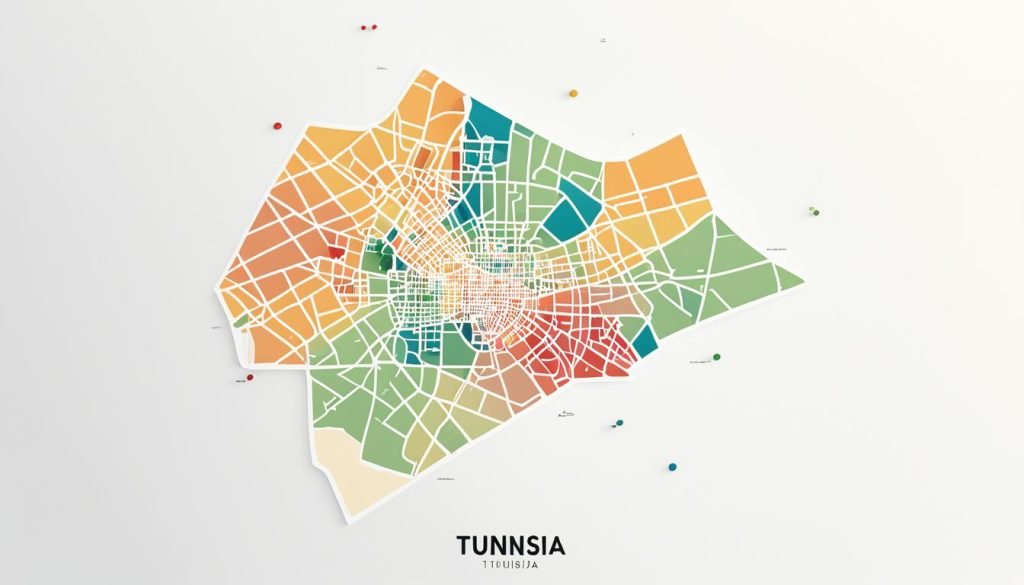
| City | Population | Economic Contributions |
|---|---|---|
| Tunis | 638,845 | Cultural, political, financial hub |
| Sfax | 330,440 | Commercial, maritime gateway |
| Sousse | 221,530 | Tourism, historical sites |
| Bizerte | 143,000 | Commercial port, industry |
| Ariana | 114,486 | Residential, growing service sector |
Looking closer at Tunisia’s big cities shows their true importance. It’s not just about how many people live there. Each city has a special role that helps shape the country’s culture and economy. Together, they form a vibrant urban landscape in Tunisia.
The Cultural and Economic Hubs of Tunisia
Tunisia is growing in its city life. The core of its economy and culture is in Tunis, Sfax, and Sousse. These cities blend old history with new growth well. They each add something special to Tunisia’s reputation as a lively area in North Africa.
The Capital City of Tunis: A Melting Pot of Traditions
Tunis is bustling with life. It mixes culture and development. It’s not just the capital, but also the cultural heart. It shows traditions from many cultures over time.
The city’s medina is a historic treasure with beautiful Islamic buildings. It’s recognized globally, attracting scholars and tourists. This mix of old and new makes Tunis key for Tunisia’s culture.
Sfax and Sousse: Pillars of Commerce and Tourism
Sfax stands out in business. Located well, Sfax city Centre shines in sea trade and farming. Its olive oil export marks it as an economic leader in Tunisia.
Then there’s Sousse, famous for history and modern growth. Its beaches and cultural spots draw people from all over. This boosts both its economy and cultural significance.
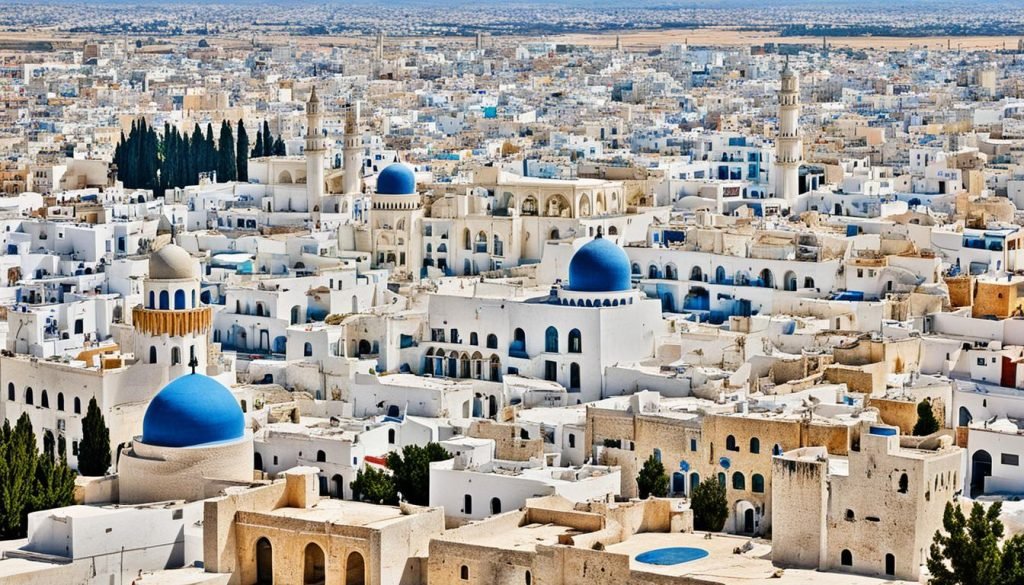
Together, these cities tell the story of Tunisia. They bring together strong economies and rich cultures. This shows a country proud of its history and ready for the future.
Tunisia’s Urban Expansion and Its Impacts
Tunisia’s cities are growing fast, bringing many changes. There are big changes for people, businesses, and nature. Everyone involved faces new challenges due to this growth.
Effects of Rapid Urbanization
Cities like Tunis are getting bigger quickly. More people are moving from the countryside to the city. This move brings new jobs and opportunities but also creates problems.
There’s a need for more houses, roads, and services. But, this growth can be hard to manage.
Challenges Facing the Big Cities of Tunisia
Big cities in Tunisia are dealing with many problems. Lots of people means more garbage and greater energy use. These issues make it hard for cities to keep up.
There’s a strong need to fix these problems. Better planning and taking care of the environment are essential.
Initiatives for Sustainable Urban Development
Tunisia is trying new things to make cities better. Green projects and careful planning aim to solve big problems. These efforts help cities become more eco-friendly and efficient.
Using solar power is a key step. It makes cities run cleaner and supports growth.
| Development Initiative | Focus Area | Impact |
|---|---|---|
| Solar Thermal Energy Plant | Renewable Energy Production | Reduction in carbon emissions and dependency on non-renewable sources |
| Urban Green Spaces Program | Environmental Regeneration | Enhanced biodiversity and improved urban air quality |
| Eco-city Development | Sustainable Housing and Infrastructure | Resource-efficient, sustainable living environments |
These green efforts show how important being sustainable is. They help Tunisia’s cities grow in a good way, fitting global goals.
Conclusion
Thinking about Tunisia, you see its cities growing strong and vibrant. Places like Tunis, Sfax, and Sousse are key. They add a lot to Tunisia’s culture and help its economy grow. These cities are connected by their dreams for a bright Tunisia’s urban future.
In facing challenges like crowded streets and caring for the planet, Tunisia’s cities stay positive. They work on green projects to grow without harming nature. The urban growth strategy in Tunisia plans carefully. It looks after the people, honors old traditions, and protects the environment for tomorrow.
Learning about these cities shows a future where old and new blend beautifully. With smart planning and new ideas, Tunisia is a leader in city development. It thinks about everyone and leads with creativity. As Tunisia moves ahead, its cities are ready to change and thrive, just like the lively streets of Tunis and the busy ports of Sfax and Sousse.

